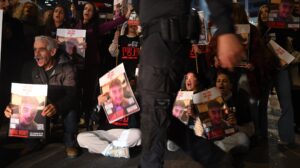By Ron Kampeas
(JTA) — Hamas released another 10 Israeli hostages, nine women and a 17-year-old girl, on the first day of a two-day extension of a ceasefire, one the Biden Administration hopes to further extend as it seeks to expand humanitarian relief for Palestinians in the war-ravaged Gaza Strip.
The hostages released Tuesday bring the total of Israeli hostages released to 61. Also released were two Thais, bringing the total number of foreigners released to 20. They are among an estimated 240 hostages taken when Hamas terrorists attacked Israel from Gaza on Oct. 7.
Virtually all of the released hostages and Palestinian prisoners are women and children. Released on Tuesday were:
Gabriela Leimberg, 59, and her daughter Mia, 17. Mia, the only minor released Tuesday, was kidnapped with her Shih Tzu dog, Bella, and was photographed crossing over to the care of Red Cross officials carrying the dog. The Leimbergs are Jerusalem residents who were visiting friends in Nir Yitzhak, a kibbutz, when they were abducted.
Rimon Kirsht, 36, a resident of Kibbutz Nirim. Her husband, Yagev, remains a hostage.
Clara Merman, 63, a resident of Nir Yitzhak. Her partner and her brother remain hostages.
Ofelia Roitman, 77, from Kibbutz Nir Oz. Like Gabriela Leimberg, Roitman is an immigrant from Argentina.
Ditza Heiman, 84, one of the founders of Nir Oz. She was seen being transferred to Red Cross custody in a wheelchair.
Tamar Metzger, 78, from Nir Oz. Her husband, Yoram, 80, remains a hostage.
Noralin Babadilla, who was visiting friends in Kibbutz Nirim with her partner, Gideon Babani, who was murdered on Oct. 7.
Ada Sagi, 75, a resident of Kibbutz Nir Oz.
Meirav Tal, 53, who was visiting Nir Oz with her partner, Yair Yaakov. Yaakov’s sons, Yagil and Or, were released Monday. Yair remains a hostage.
Tuesday was the first day of a two-day extension of the four-day ceasefire between Israel and Hamas, brokered by Qatar, one of a handful of nations that maintains ties with Hamas, Egypt and the United States. Under the terms of the ceasefire, Israel releases three times as many Palestinians imprisoned on terrorism-related charges.
With just one day of the extension remaining, there are talks open about lengthening the ceasefire. Hamas has reportedly offered to release soldiers and men in a next phase, but its terms are not clear. Any exchange of soldiers is seen as likely requiring the release of more and higher-profile Palestinian security prisoners, as well as a longer or permanent ceasefire.
Those terms are unlikely to be accepted by Israel, which does not want to lose the momentum it has gained in six weeks of striking back against Hamas. It has mostly dismantled the terrorist group in the north of the strip, according to reports, in massive air and ground attacks that have also driven half of Gaza’s 2 million population to the southern portion of the strip.
Israel’s stated war aim is the return of all the hostages and the removal of Hamas from power. U.S. President Joe Biden, under increasing pressure from the international community and from within his own Democratic Party, has stood by those war aims and rejected a long-term ceasefire.
But Biden is unhappy with the extent of Israel’s counterstrikes. The Hamas-controlled Gaza health ministry says more than 13,000 people, including thousands of children, have been killed. It is not known what portion of that number are combatants and what portion were killed by misfired rockets aimed at Israel.
Two top Biden Administration officials told reporters on Monday evening that Biden hoped to extend the humanitarian pauses in order to expand assistance reaching the Palestinians. Israel has opened up corridors for such assistance, under pressure from Biden.
“We would like to see the deal — the current humanitarian pause deal extended as long as possible,” said one of the senior administration officials, who conducted the briefing on condition of remain ing anonymous. “So, we would like to see that going as long as there are additional hostages to get out.”
The officials, in unusually stern language — even for a briefing in which they did not have to be named — said Israel could not resume the war with the ferocity with which it had conducted itself until now.
“You cannot have the sort of scale of displacement that took place in the north replicated in the south. It will be beyond disruptive,” one of the officials said. “It will be beyond the capacity of any humanitarian support network, however reinforced, however robust to be able to cope with. It can’t happen, which means that the manner of the campaign has to be extremely carefully thought through to minimize this consequence of further, significant displacement.”




